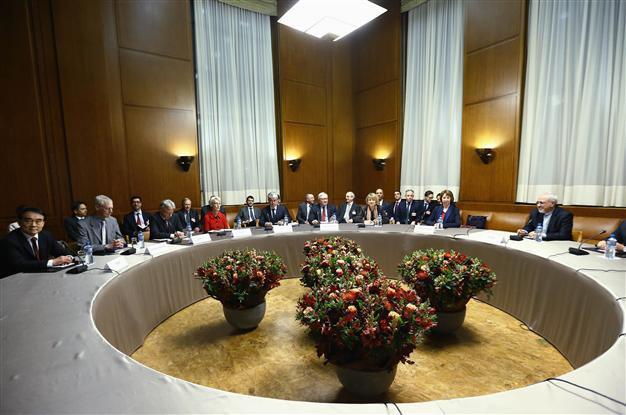Iran, EU inch towards putting nuclear deal into action
GENEVA - Agence France-Presse

Negotiators have said they want to implement the deal, which aims to rein in Tehran's nuclear programme in exchange for some sanctions relief, by January 20.
Iran and EU representatives met for a second day Friday to discuss how to implement a landmark deal on containing Tehran's nuclear programme, which they aim to put into action within 10 days.
Negotiators have said they want to implement the deal, which aims to rein in Tehran's nuclear programme in exchange for some sanctions relief, by January 20.
The diplomats were painstakingly poring over three outstanding issues in a bid to put the groundbreaking November 24 deal into action, Iran's deputy chief nuclear negotiator Abbas Araqchi said.
"We still have disagreement on three points... If we solve these issues then the Geneva deal will be executable," Araqchi told Iranian state-run TV.
He was meeting for a second and final day Friday in Geneva with Helga Schmid, deputy to EU foreign policy chief Catherine Ashton, whose office represents the so-called P5+1 group of world powers -- Britain, China, France, Russia and the United States plus Germany.
On Thursday, the two had "reviewed one or two of the remaining points and discrepancies and exchanged opinions," he said, adding that they had agreed to take a break to allow Schmid to consult with the P5+1.
"Ms. Schmid has a heavy responsibility because on every single issue she has to consult with each of the six countries," he said.
During the first day of talks, the pair also met with top US nuclear negotiator Wendy Sherman, who provided "views and information that was useful to discussions to address any remaining issues to the agreement to the joint plan of action," the State Department said late Thursday. Sherman, who travelled on to Moscow Friday, also held a brief meeting with Iran.
Western powers and Israel fear Iran is seeking to develop the atomic bomb under the guise of a civilian nuclear programme, but Tehran has always denied this.
Under the November deal, Iran agreed to curb parts of its nuclear drive for six months in exchange for receiving modest relief from international sanctions and a promise by Western powers not to impose new measures against its hard-hit economy.
Technical experts from both sides have since November held several sessions in Geneva aimed at fine tuning the deal.
But when experts held four days of talks last month in Vienna -- home of the International Atomic Energy Agency -- the Iranians walked out after Washington expanded its sanctions blacklist against Tehran.
And the latest round of talks in Geneva comes as Iranian leaders increasingly voice concern and frustration at the slow pace of implementation.
Iran's President Hassan Rouhani warned in a phone conversation with his Russian counterpart Vladimir Putin Thursday against "seeking excuses that would create problems in the negotiation process," Iran's ISNA news agency reported.
He also called on "certain countries ... to respect their own commitments (under the Geneva deal) and avoid new strictures that would shadow their goodwill." Some observers have also warned a new generation of nuclear centrifuges, which could potentially enable Iran to rapidly purify uranium to a weapons-grade level, might become a sticking point in the talks.
Two weeks ago, Iran's atomic energy chief Ali Akbar Salehi said Tehran was "testing third and fourth generations of its centrifuges," which were almost five times more effective that the current ones.
A Vienna-based diplomat told AFP the probem was that the November plan "wasn't that specific" on the issue, meaning it is "open to interpretation by both sides".
The interim deal is meant to buy time for diplomacy to clinch a lasting agreement that would allay Western suspicions that Iran is covertly developing nuclear weapons.
